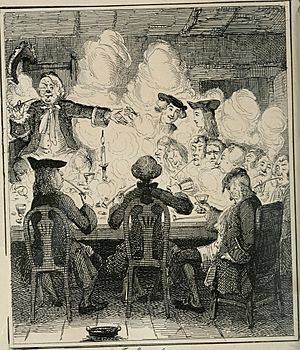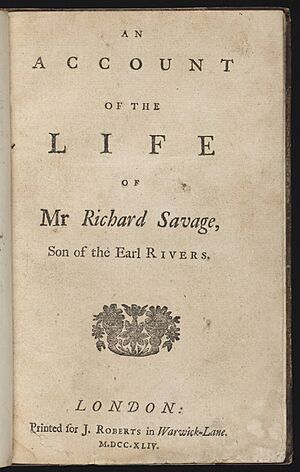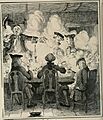Richard Savage (poet) facts for kids
Quick facts for kids
Richard Savage
|
|
|---|---|

Illustration from Richard Savage: A Romance of Real Life by Charles Whitehead
|
|
| Born | c. 1697 England |
| Died | 1 August 1743 (aged 46) Bristol |
| Occupation | Poet, satirist |
| Relatives | Richard Savage, 4th Earl Rivers (father, disputed) Anne Gerard, Countess of Macclesfield (mother, disputed) |
Richard Savage (born around 1697 – died 1743) was an English poet. He is famous because of a book written about his life by Samuel Johnson, called Life of Savage. This book, published in 1744, tells the interesting and sometimes sad story of Savage's life. Johnson's book is one of his most detailed Lives of the English Poets.
Contents
Richard Savage's Life Story
His Early Years
Most of what we know about Richard Savage's early life comes from Samuel Johnson's book. However, Johnson mostly used old books and magazines for his information. He did not do a lot of his own research.
Richard Savage claimed he was born in 1697. He said his mother was Anne Brett and his father was Richard Savage, 4th Earl Rivers. He believed his mother did not want him. He claimed she tried to stop his father from leaving him money. Savage also said she tried to send him away to the West Indies and made him work as a shoemaker.
Savage believed he found out his true identity in 1714. This happened after he read some letters from a woman named Mrs. Lloyd, who he said was his godmother. In 1715, he was arrested and identified himself as "Mr. Savage, natural son to the late Earl Rivers." He continued to use this name.
Starting His Career
Richard Savage's first known work was a poem called The Convocation (1717). He later tried to stop people from reading it. He also wrote a play called Love in a Veil (1718), which helped him become friends with Richard Steele. Steele was an important writer who helped Savage at first.
In 1723, Savage acted in his own play, Sir Thomas Overbury. The play made him quite well-known. Around this time, his life story became popular in literary groups. He even appeared as a character in a novel by Eliza Haywood.
Later, Savage became friends with writer Aaron Hill. Hill helped Savage meet important people and promote his work. Savage's book, Miscellaneous Poems, was published in 1726. In this book, he openly shared his story. He also hinted at his mother's role in his life. Some say his mother paid him money to stop him from publishing more about her.
A Difficult Time
In 1727, Richard Savage was involved in a serious incident. After drinking late one night, he and two friends got into a fight at a coffeehouse. During the fight, a man named James Sinclair was badly hurt and later died. Savage and his friends were arrested.
When they went to court, Savage and one friend were found guilty of murder. This was a very serious charge. However, it was common for people to ask the king or queen for a special pardon to avoid the death penalty. Many people helped Savage by asking for a pardon. Even his mother's nephew, Lord Tyrconnel, asked for him to be pardoned.
Savage's mother, Mrs. Brett, did not help him. She even told a story that Savage had tried to harm her in the past. Luckily for Savage, the Countess of Hertford asked Queen Caroline for help. The Queen agreed, and Savage was saved from the death penalty.
Becoming Famous and Later Struggles
Being found guilty and then pardoned made Savage very famous. People talked about his story in coffeehouses. This fame led him to publish a poem called The Bastard in 1728. In this poem, he wrote about his mother and his trial.
In 1729, Savage published The Wanderer, a long poem that many consider his best work. Around this time, he also started receiving a yearly payment of £200. This money came from Lord Tyrconnel, who was his mother's nephew. It seems Savage got this money by threatening to write bad things about his mother if she did not pay him. With this money, Savage lived a comfortable life.
However, his deal with Lord Tyrconnel meant he had to be quiet as a poet for a few years. He did get another payment of £50 a year from Queen Caroline starting in 1732. This was because he became a "Volunteer Laureate" for her. But by 1735, his relationship with Lord Tyrconnel got worse. Tyrconnel stopped his payments and asked him to leave his apartment. Savage became poor again and started writing for The Gentleman's Magazine.
Friendship with Samuel Johnson and His Last Years

Richard Savage became friends with the famous writer Samuel Johnson in the late 1730s. Johnson often walked around London with Savage at night. He saw how poor Savage was and how he was sometimes treated badly in public. These experiences gave Johnson much of the information for his book, Life of Savage. Johnson admired Savage's independent spirit.
Savage's money problems got worse. To help him, his friend Alexander Pope and others tried to send Savage to Wales. There, he could live on a yearly allowance of £50. Savage did not want to go, but he eventually left London in 1739. This meant he and Johnson stopped spending time together.
While in Wales, Savage lived in Swansea. He later moved to Bristol, England. He finished a new version of his play, Sir Thomas Overbury, there. Savage was often bothered by people he owed money to.
On January 10, 1743, Savage was arrested for a debt of eight pounds. He was put in the debtors' section of Bristol Newgate Prison. He died there on August 1, 1743, likely due to health problems from drinking.
His Family Background
Richard Savage's claim about who his parents were is a big part of his story. He always said that Anne Brett was his mother. However, she never said he was her son. She claimed that the children she had with Earl Rivers died when they were babies.
But there are some reasons to believe Savage. For example, he received a yearly payment of £200 from Lord Tyrconnel, who was Mrs. Brett's nephew. This might suggest that Tyrconnel believed Savage was related to the family.
On the other hand, Savage's story had some differences from official records. For instance, he was wrong about his birth date. Mrs. Brett always said he was an impostor. Historians have studied this topic a lot. Some, like Clarence Tracy, believed Savage's claims. Others, like James Boswell, were suspicious.
Richard Savage was also the subject of a play called Richard Savage by J. M. Barrie. The Savage Club in London is named after him.
Notable Works
Plays
- Love in a Veil (1718)
- Sir Thomas Overbury (1723)
Poems
- The Convocation, or the Battle of the Pamphlets (1717)
- The Bastard (1728)
- The Wanderer (1729)
- An Author to Be Let (1730)
Collected Books
- The Poetical Works of Richard Savage (1962) edited by Clarence Tracy
See also
 In Spanish: Richard Savage para niños
In Spanish: Richard Savage para niños
Images for kids
 | James Van Der Zee |
 | Alma Thomas |
 | Ellis Wilson |
 | Margaret Taylor-Burroughs |



